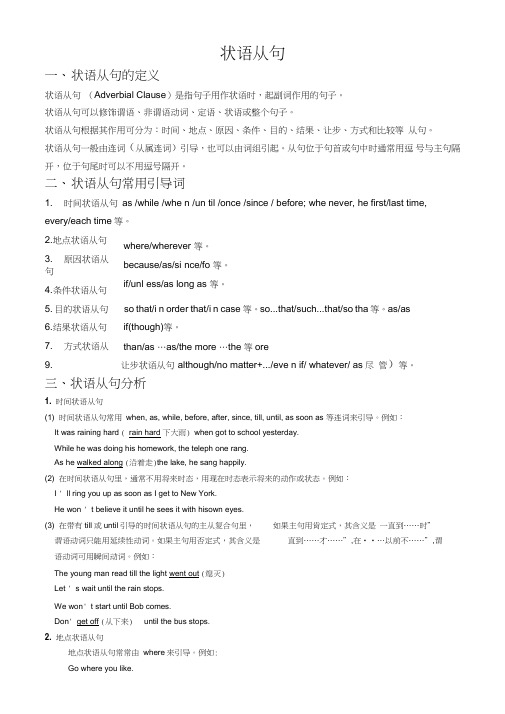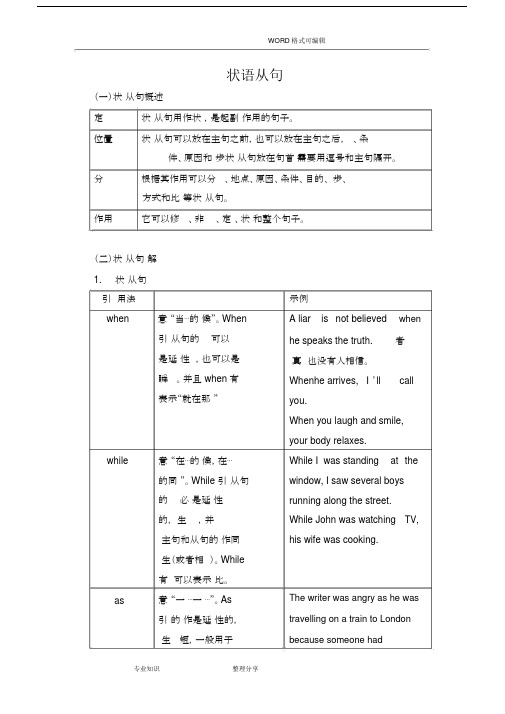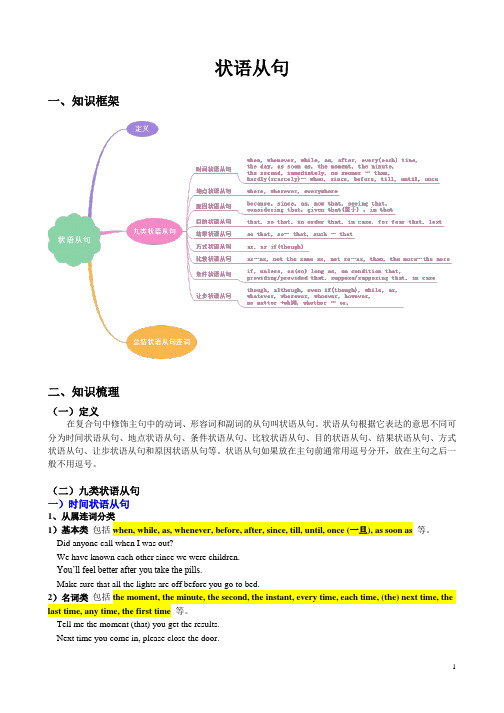高中原因状语从句及练习(含答案)教学提纲
语法专题:状语从句(含练习和答案)

状语从句一、状语从句的定义状语从句(Adverbial Clause)是指句子用作状语时,起副词作用的句子。
状语从句可以修饰谓语、非谓语动词、定语、状语或整个句子。
状语从句根据其作用可分为:时间、地点、原因、条件、目的、结果、让步、方式和比较等从句。
状语从句一般由连词(从属连词)引导,也可以由词组引起。
从句位于句首或句中时通常用逗号与主句隔开,位于句尾时可以不用逗号隔开。
二、状语从句常用引导词1. 时间状语从句as /while /whe n /un til /once /since / before; whe never, he first/last time,every/each time等。
2. 地点状语从句3. 原因状语从句4. 条件状语从句5. 目的状语从句6. 结果状语从句7. 方式状语从句where/wherever 等。
because/as/si nce/fo 等。
if/unl ess/as long as 等。
so that/i n order that/i n case等。
so...that/such...that/so tha等。
as/as if(though)等。
than/as …as/the more …the 等ore9. 让步状语从句although/no matter+.../eve n if/ whatever/ as尽管)等。
三、状语从句分析1. 时间状语从句(1) 时间状语从句常用when, as, while, before, after, since, till, until, as soon as 等连词来引导。
例如:It was raining hard ( rain hard 下大雨) when got to school yesterday.While he was doing his homework, the teleph one rang.As he walked along (沿着走)the lake, he sang happily.(2) 在时间状语从句里,通常不用将来时态,用现在时态表示将来的动作或状态。
(完整word版)状语从句讲解和习题附答案解析.doc

WORD格式可编辑状语从句(一)状从句概述定状从句用作状,是起副作用的句子。
位置状从句可以放在主句之前,也可以放在主句之后,、条件、原因和步状从句放在句首需要用逗号和主句隔开。
分根据其作用可以分、地点、原因、条件、目的、步、方式和比等状从句。
作用它可以修、非、定、状和整个句子。
(二)状从句解1.状从句引用法when意“当⋯的候”。
When引从句的可以是延性,也可以是瞬。
并且 when有表示“就在那”while 意“在⋯的候,在⋯的同”。
While 引从句的必是延性的,生,并主句和从句的作同生(或者相)。
While有可以表示比。
as 意“一⋯一⋯”。
As引的作是延性的,生短,一般用于示例A liar is not believed when he speaks the truth. 者真也没有人相信。
Whenhe arrives, I ’ll call you.When you laugh and smile, your body relaxes.While I was standing at the window, I saw several boys running along the street. While John was watching TV, his wife was cooking.The writer was angry as he was travelling on a train to London because someone had主句和从句作同invaded his “space”.生;as 也可以一前一He smiled as he stood up.后。
after 意“在⋯之后”。
表示主With many hungry visitors 句作生在从句作之waiting, don’t stay too后。
主句与从句的作long at your table after you关系与 before 引的have finished.从句相反。
(完整版)原因、结果、目的状语从句讲解和练习(答案)(完美排版)

Lesson 55-59状语从句总结一、原因状语从句(1)原因状语从句通常由because, since, as, for引导。
(2)because表示直接原因,语气最强。
because引导的原因状语从句多放在主句之后。
回答由why提出的问题,只能用because。
此外,because和so不能同用在一个句子里。
例如:------Why aren’t going there?------Because I don’t want to.since引导原因状语从句,相当于now that,意思是“因为……,既然……,鉴于……”。
例如:Since the rain has stopped,let’s go for a walk. 既然雨停了,我们出去散散步吧。
as和since语气较弱,一般用来表示明显的原因。
由as和since引导的原因状语从居多放在句首。
例如:As he has no car, he can’t get there easily.Since we have no money, we can’t buy it.(4)for表示所说的理由是一种补充说明,for引导的从句一般不放在句子的开头。
如:I decided to stop and have lunch, for I was feeling quite hungry.练习:I was late for class yesterday _______ there was something wrong with my bike.He took off his coat _______ he felt hot.you c an’t answer the question, I’ll ask someone else.二、结果状语从句(1)结果状语从句由so…that, such…that, so that引导。
(2)so…that语such...that可以互换。
高中英语状语从句详解及习题精练附答案

状语从句一、知识框架二、知识梳理(一)定义在复合句中修饰主句中的动词、形容词和副词的从句叫状语从句。
状语从句根据它表达的意思不同可分为时间状语从句、地点状语从句、条件状语从句、比较状语从句、目的状语从句、结果状语从句、方式状语从句、让步状语从句和原因状语从句等。
状语从句如果放在主句前通常用逗号分开,放在主句之后一般不用逗号。
(二)九类状语从句一)时间状语从句1、从属连词分类1)基本类包括when, while, as, whenever, before, after, since, till, until, once (一旦), as soon as等。
Did anyone call when I was out?We have known each other since we were children.You’ll feel better after you take the pills.Make sure that all the lights are off before you go to bed.2)名词类包括the moment, the minute, the second, the instant, every time, each time, (the) next time, the last time, any time, the first time等。
Tell me the moment (that) you get the results.Next time you come in, please close the door.He felt nervous each time she spoke to him.The last time we talked he said he needed another two days.3)副词类如immediately, directly, instantly, presently等。
高中英语 状语从句专项讲解及练习(有答案)

状语从句1、地点状语从句地点状语从句表示地点、方位,这类从句通常由where, wherever, anywhere, everywhere引导。
Where there is a will, there is a way.有志者,事竟成。
They will go where they are happy.他们想到他们觉得快乐的地方去。
We must camp where we can get water. 我们必须在能找到水的地方露营。
地点状语从句与定语从句的区别:在于分句在句中作什么成分。
作状语,则是状语从句;作定语修饰名词,则是定语从句。
where引导定语从句时,从句前应有一个表示地点的名词作先行词;而状语从句前则无需先行词。
如:Go back where you came from.(where引导地点状语从句)Go back to the village where you came from.(where引导定语从句,修饰village)We went home, where we had dinner. (where引导定语从句,修饰home)2、原因状语从句原因状语从句一般由because(因为),since(既然),now that(既然,因为),as(由于)等连词引导。
(1)because表示直接的原因,表示原因的语气最强,常表示必然的因果关系。
回答why引起的特殊疑问句,只能用because。
Jane wore a raincoat because it was raining.因为天下雨,所以詹穿着雨衣。
He is absent today because he is ill.他今天缺课,因为他病了。
(2)since表示对方已经知晓、无须加以说明的原因或事实,语气比because稍弱。
I'll do it for you since you are busy.既然你忙,我来替你做吧。
状语从句精讲及练习及答案

状语从句精讲及练习及答案状语从句由从句担任的状语,在句子中可修饰谓语(或其它动词)、形容词、副词或是整个句子,它可以用来表示时间、地点、原因、目的、结果、条件、方式、比较、让步等。
状语从句是一较大的语法项目,也是近几年高考题中常见的一个重要试点。
高考中已考查了时间、让步、地点、条件、目的等状语从句,这些从句仍是今后高考热点,应作充分准备。
同时对方式状语从句也应引起重视。
(一)时间状语从句表示时间的状语从句可由when,as,while,whenever,after,before,till(until),since,once,as soon as(或the moment),by the time,no sooner…than,hardly(scarcely)…when,every time等引导。
e.g.When I came into the office,the teachers were having a meeting.He started as soon as he received the news.Once you see him,you will never forget him.No sooner had I gone to bed than I went to sleep.(二)原因状语从句原因状语从句是表示原因或理由的,引导这类从句的最常用的连词是because,since,as,now that(既然)等,for表示因果关系时(它引导的不是从句)为并列连词,语气不如because强。
e.g.He is disappointed because he didn't get the position.As it is raining,I will not go out.Now that you mention it,I do remember.(三)地点状语从句引导地点状语从句的连词是where和wherever等。
状语从句讲解及习题附答案word文档良心出品

状语从句讲解及习题附答案word文档良心出品(一)状语从句概述(二)状语从句详解1.时间状语从句引导词用法示例whe n 意为“当…的时候” When A liar is not believed when 引导从句的谓语动词可以he speaks the truth. 说谎者讲是延续性动词,也可以是真话时也没有人相信。
瞬间动词。
并且when有When he arrives , I 'call you.时表示“就在那时”When you laugh and smile,your body relaxes.while 意为“在??的时候,在…的While I was standing at the 同时” While引导从句的window, I saw several boys谓语动词必须是延续性running along the street.的,发生时间较长,并强调主句和从句的动作同时发生(或者相对应)。
While有时还可以表示对比。
as 意为“一边…一边…” As引导的动作是延续性的,发生时间较短,一般用于主句和从句动作同时发生;as也可以强调一前一后。
after 意为“在??之后”表示主句动作发生在从句动作之后。
主句与从句的动作时间关系与before引导的从句相反。
before 意为“在??之前”引导的从句不用否定形式的谓语,并且当before引导的从句位于主句之后,有时译成While John was watchingTV, his wife was cook ing.The writer was angry as hewas travelling on a train to London because someonehad inv aded his sp ace ”.He smiled as he stood up.With many hungry visitors waiting, don' stay too longat your table after you havefini shed.If an early exit is n ecessary, you can leave after a sceneis over.You can ' watch TV beforeyou finish your homework. Before it ended, the theatre was almost empty.“就才”当主句用将来时,My father had left for Ca nada意为“自从,从??以来”引since I have been studying hardI will call you as soon as Iarrive.2. 地点状语从句引导词用法示例where意为“哪里。
高中英语 状语从句精讲及专项练习(有答案)

状语从句新课讲解知识点1)状语与状语从句状语(adverbial)状语(adverbial)的定义:英语中,修饰动词、形容词、副词等的句子成分叫状语(adverbial)。
状语的功用:状语说明地点、时间、原因、目的、结果、条件、方向、程度、方式和伴随状况等。
状语一般由副词、介词短语、分词和分词短语、不定式或相当于副词的词或短语来担当。
其位置一般放在句末,但也可放在句首或句中。
副词是一种用来修饰动词,形容词,副词或全句的词,说明时间,地点,程度,方式等概念。
请判断状语部分。
1.Naturally, our grandparents were pleased to get our phone call. ( )2.We worked hard, from sunrise to sunset. ( )3.Seen from a distance, the farmhouse looked deserted. ( )状语的位置比较灵活,可以位于句首、句末或句中。
enough用作状语修饰形容词和副词时必须后置。
状语从句(Adverbial Clause)根据其作用可分为时间、地点、原因、条件、目的、结果、让步、方式和比较等从句。
状语从句一般由连词(从属连词)引导,也可以由词组引起。
从句位于句首或句中时通常用逗号与主句隔开,位于句尾时可以不用逗号隔开。
解题要领:了解各类状语从句典型连词的基本意思,弄清主从句之间的逻辑关系,代入题干进行校对。
状语从句在句中作状语,修饰主句中的动词,形容词或副词等。
状语从句放在主句之前时,常用逗号分开;放在主句之后,一般不用逗号,状语从句按其意义和作用可分为时间、条件、原因、让步、目的、结果、方式、比较、地点等9种。
引导状语从句的连词分类1.时间和条件状语从句讲求“主将从现”的时态规则,但要注意whether一词。
⏹Whether it rains (rain) or not, I shall go out for an outing tomorrow.⏹Can you tell me whether it will rain (rain) tomorrow?⏹Whether it will do (do) us more harm than good remains to be seen.当whether作“无论”解,用现在时表将来。
- 1、下载文档前请自行甄别文档内容的完整性,平台不提供额外的编辑、内容补充、找答案等附加服务。
- 2、"仅部分预览"的文档,不可在线预览部分如存在完整性等问题,可反馈申请退款(可完整预览的文档不适用该条件!)。
- 3、如文档侵犯您的权益,请联系客服反馈,我们会尽快为您处理(人工客服工作时间:9:00-18:30)。
2.原因状语从句原因状语从句表示主句中动作或状态发生的原因或理由, 可位于主句之前,之后或插在主句中间。
主句表示结果, 从句表示原因, 主要由because, as, since, for,seeing ( that), considering ( that), now (that), in that, not ... because 等引导。
1) because“因为’’, as‘‘由于”, since “既然”, for“因为”because意为“因为”, 表示直接的原因或理由, 着重点在从句, 用于回答why,语气最强。
He is absent today because he is ill.当主句为否定句时, 从句because须用逗号与主句隔开, 否则容易引起歧义。
I didn’t visit him, because I wanted to borrow some books.我没去拜访他, 因为我想借几本书。
I didn’t visit him because I wanted to borrow some books.我不是因为想借几本书才去拜访他的。
as意为“由于”, 表示十分明显的原因, 所引导的从句常位于主句之前, 有时也可位于主句之后, 一般说明因果关系, 着重点在主句, 原因或理由只是附带说明, 不用于回答why的问题, 常用于口语。
As it is snowing, we shall not go to the park.As this book is written in simple English, it is suitable for beginners.since意为“既然, 由于”时表示对方已知的、无须加以说明的既成事实的理由, 只是一个附带说明。
since = as it is the fact that ...全句中心在主句。
如从句表示的原因不是确定的事实, 就不能用since,通常用because.Since everybody is here, let’s begin our discussion.Since you seem to know them, why don’t you introduce me to them?for是一个并列连词, 由for连结的表原因的句子常看作并列句, 它只提供一些补充说明或对前一个分句加以解释, 不可前置。
与because 不同的是:because引导的从句位置可前可后, 而for引导的分句只能后置, 且往往须用逗号或分号与前一个分句分开。
I didn’t go to see him, for a heavy snow was falling.The days were short, for it was now December.有时, for引起的从句并不表示原因, 而是表示一种推断或解释, 而because则不能。
Someone in the house must be ill, for a doctor has just come out.He couldn’t have seen me, for I was not there.一、填入恰当的连词1. I didn’t go to school yesterday _________ I was ill.2. ________ everybody is here, let’s begin our meeting.3. ________ you are in poor health, you should not stay up late.4. I asked her to stay to tea, ________ I had something to tell her.5. ________ all the passengers are here, why don’t we start at once?6. Bill won’t make any progress ________ he doesn’t study harder than before.7. He might have gone to bed, ________ the light went out.1.because2.Since3.As4.because5.Since6.because7.for二、填入恰当的连词1. ______ you do not understand, I will explain again.2. ______ Jane was the oldest in this family, she had to look after the others.3. He must be ill, ______ he is absent today.4. The teacher must be strict with you ______they want you to make great progress.5. _____your father is well again, you no longer have anything to worry about.6. The day breaks, _____the birds are singing.7. ______ you are ill, you’d better go to see the doctor.8. ______ she was late for class, she had to say sorry.1.since2. As3. for4. because5. Since6. for7. Since8. As2) 用下列短语引导:seeing (that) “鉴于, 既然”, considering (that) “考虑到”now (that)“既然”, in that “因为”, not ... because “不是因为”not that……but that “不是因为……而是因为, ’seeing that与considering that同义, 含义近似since,所引导的句子中心在主句, 重在强调结果。
Seeing that the weather is bad, we’ll stay at home.Considering that they are newcomers, they’ve accomplished a lot.now that的含义与since(“既然”)接近, 区别在于:since表示原先已存在的情况, 而now that 表示由于新情况的出现而促成某事发生。
Now that it has stopped raining, let’s start at once.Now that you are all here, let’s try to reach a decision.in that作“因为”解时, 由于介词in的含义是指“在……方面”, 有限制作用, 因此多指由于某一方面的原因或理由, 不能位于句首。
I like the city, but I like the country better in that I have more friends in the country.I could understand his point of view, in that I’d been in a similar position myself.not ... because意为“不是因为”, 该结构中的not否定because。
She didn’t marry you because you had money.她不是因为你有钱才嫁给你。
The machine didn’t stop because the fuel was used up.机器不是因为燃料耗尽才停下来的。
not that ... but that作“不是因为……而是因为”解。
Not that I don’t like the film, but that I have no time for it.He felt a bit worried, not that they were not working hard, but that they didn’t pay enough attention to safety.家庭作业选择恰当的答案1. The man can’t get on the bus ______ there is no room on it.A. thoughB. becauseC. until D so that2. ______ her daughter hadn’t come back, ______ she looked worried.A. Because, /B. Because, soC. Though, butD. Though, /3._______ you’ve got a chance, you might make full use of it.A. Now thatB. AfterC. AlthoughD. As soon as4. He found it difficult to read, _______ his eyesight was beginning to fail.A. andB. forC. butD. or5. A man cannot smile like a child, ________ a child smiles with his eyes, while a man smiles with his lips alone.A. soB. butC. andD. for1.B2.A3.A4.B5.D1.____ nobody was very interested in it, they decided to cancel the trip.A. Even thoughB. As soon asC. WhileD. Seeing that2.____ our country has so many good table-tennis players, we have to decide on the best ones to take part in the game.A. AlthoughB. SinceC. IfD. While3. Not that John doesn’t want to help you, ____ it’s beyond his power.A. but thatB. for thatC. and thatD. in that4. Animals suffered at the hands of man____ their habitats were destroyed by people to make way for agricultural land.A. in whichB. for whichC. so thatD. in that5.____ Tom has no interest in piano, there is no point pushing him to learn it.A. Now thatB. In caseC. Even ifD. As if(D;B;A;D;A)1.____ you’ve got a chance, you might as well make full use of it.A. Now thatB. AfterC. AlthoughD. As soon as2. He found it increasingly difficult to read, ____ his eyesight was beginning to fail.A. andB. ForC. ButD. or3. A man cannot smile like a child, ____ a child smiles with his eyes, while a man smiles with his lips alone.A. SoB. ButC. andD. for4. I didn’t go _____ I was afraid.A. SinceB. ForC. BecauseD. Though5. ______ it was raining, ______ we stayed at home.A. Because, soB. Because ,/C. Because ,forD. If ,so6. I said nothing about it ____ his wife was there.A. sinceB. so thatC. becauseD. unless7. ______ the weather is so bad, we have to delay our journey.A. beforeB. sinceC. tillD. After8. _____ it is raining, you’d better take a taxi.A. beforeB. asC. tillD. after9. You shouldn’t get angry just ______ some people speak ill of you.A. sinceB. so thatC. becauseD. unless10. _____ you are here, you’d better stay.A. beforeB. Now thatC. tillD. after11. I hurried ________I wouldn’t be late for class.A. sinceB. so thatC. as ifD. unless12. I saw Mr. Smith last Sunday. We had not seen each other ________I left London.A. asB. beforeC. sinceD. till13. ________ you are so weak, you’d better stay at home.A. SinceB. ForC. BecauseD. Though14. I’m sorry you’ve been waiting so long, but it’ll still be some time ____ Brian get back.A. beforeB. sinceC. tillD. after15. —Did you return Fred’s call?—I didn’t need to ____ I’ll see him tomorrow.A. thoughB. unlessC. whenD. Because16. Accustomed to______ the steep mountains, he had no difficulty reaching the top.A. climbingB. climbC. having climbedD. have climbed17. ______ we’ve no money, we can’t buy it.A. thoughB. unlessC. whenD. As1-5: ABDCB 6-10: CBBCB 11-15: BCAAD AD。
